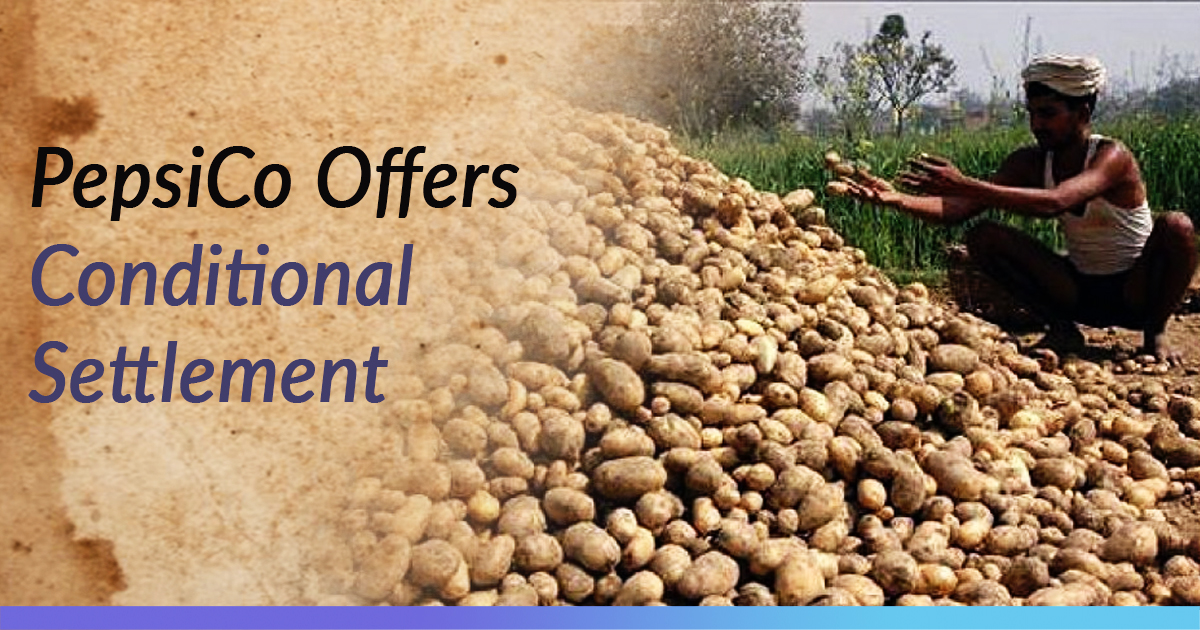After suing Gujarat farmers for Rs 1.05 crore for growing Lays chips variety potatoes, PepsiCo company has now offered a conditional settlement. In this conditional settlement, the multi-billion dollar company has offered to settle the case if farmers stop growing the particular variety.
In its statement, PepsiCo said that the company was compelled to take the judicial recourse as a last resort to safeguard the larger interest of thousands of farmers that are engaged with its collaborative potato farming program.
Conditional settlement
On April 26, in the Ahmedabad civil court, the lawyer representing PepsiCo offered a settlement. Under this conditional settlement, the farmers are asked to give an undertaking that they would cease to use their registered variety. They have also been asked to surrender their existing stocks. If that is not possible, they must enter PepsiCo’s collaborative farming programme under which farmers would buy seeds from the company and sell it back the produce.
Today 26/4/19, Advocate Anandvardhan Yagnik has filed his appearance & vakalatnama on behalf of all 4 farmers and has sought time to file reply. PepsiCo on its own submitted to the learned Commercial Court that it wants to settle the dispute with the farmers. 2/4
— Kavitha Kuruganti (@kkuruganti) April 26, 2019
To the very suggestion of settlement, Advocate Anandvardhan Yagnik submitted to the court that a proposal be put to farmers and a reply shall be sent to PepsiCo based on what farmers want to do. 4/4
— Kavitha Kuruganti (@kkuruganti) April 26, 2019
Replying to the offer made, the lawyer representing the farmers said that they would require time to consider the offer and reply to the court. The next hearing on the case is scheduled on June 12, as reported by The Hindu.
PepsiCo’s statement
Regarding the conditional settlement so proposed and about the case in general, PepsiCo has released a statement. It says,“PepsiCo India has proposed to amicably settle with people who were unlawfully using seeds of its registered variety. PepsiCo has also proposed that they may become part of its collaborative potato farming program. This program gives them access to higher yields, enhanced quality, training in best-in-class practices and better prices. In case, they do not wish to join this program, they can simply sign an agreement and grow other available varieties of potatoes. It is significant to note that the company’s collaborative potato farming program is best in class and is built on strong backward and forward linkages that improve livelihoods by using protected seeds.
The company was compelled to take the judicial recourse as a last resort to safeguard the larger interest of thousands of farmers that are engaged with its collaborative potato farming program. PepsiCo India remains deeply committed to resolving the matter and ensuring adoption of best farming practices.”
What happened?
Last week multi-billion dollar company PepsiCo had sued nine Gujarati farmers, fining them Rs 1.05 crore as damages. The fine was levied for growing a potato variety used to make Lays chips owned by the company. PepsiCo earlier defended the step taken by the company on the ground that it is done to protect the interest of the company and of the farmers working with them.
Reportedly, PepsiCo India Holdings Pvt Ltd has told the court that FL 2027 is a variety of potato, which is the hybrid of FL 1867 and the Wischip varieties. PepsiCo uses it for production of the Lays chips.
This variety has been commercially used in India since 2009 under the trademark FC5. A few farmers in Punjab were granted the license to grow the variety on the buyback system. In the court, PepsiCo said that it was tipped off about few farmers in Gujarat growing this variety in January. The results from the in-house laboratory, Indian Council of Agriculture Research (ICAR) and Central Potato Research Institute in Shimla, confirmed the suspicion, the company said. After this, the company filed cases of IPR infringements.
Activists and unions support to farmers
Activists have pledged the support to the farmers. In a press release, the Farmer Unions and Civil Society Representatives have quoted Section 39(1) (iv) of the PPV&FR Act 2001 on Chapter VI on Farmer Rights’. This section says that “a farmer shall be deemed to be entitled to save, use, sow, resow, exchange, share or sell his farm produce including seed of a variety protected under this Act in the same manner as he was entitled before the coming into the force of this Act, provided that the farmer shall not be entitled to sell branded seed of a variety produced under this Act.”
The collective has also condemned the method adopted to ascertain whether or not the farmers are using the said variety. They have alleged that private detective agencies were used to “entrap farmers, to create secret video footage and take unauthorised samples from the farmers”. Badribhai Joshi of the Gujarat Khedut Samaj also said that this could set a wrong precedent and impact farmers’ livelihood adversely.
Also Read: PepsiCo Sues Farmers For Growing Lays Variety Potatoes, Demands Rs 1.05 Crore Each












